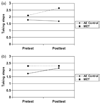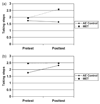Do genetic and individual risk factors moderate the efficacy of motivational enhancement therapy? Drinking outcomes with an emerging adult sample
- PMID: 19298319
- PMCID: PMC2913542
- DOI: 10.1111/j.1369-1600.2009.00149.x
Do genetic and individual risk factors moderate the efficacy of motivational enhancement therapy? Drinking outcomes with an emerging adult sample
Abstract
Research indicates that motivational enhancement therapy (MET) helps catalyze reductions in problem drinking among emerging adults. However, moderators of this intervention remain relatively unknown. Therefore, the objectives of this study were: (1) to test whether a single session of MET increased motivation to reduce drinking and drinking outcomes; and (2) to examine whether genetic dopamine D(4) receptor L (DRD4 L) and individual personality risk factors (impulsivity and novelty seeking) moderated the effects of the MET. These hypotheses were evaluated by randomly assigning a sample of emerging adult problem drinkers (n = 67) to receive a single session of MET or alcohol education. Follow-up data indicated that only individuals who were low in impulsivity, novelty seeking and/or who had the short DRD4 variable number of tandem repeats genotype evidenced differentially increased behavior change (taking steps toward reducing drinking) following the MET.
Figures


Similar articles
-
The dopamine D Receptor (DRD4) gene exon III polymorphism, problematic alcohol use and novelty seeking: direct and mediated genetic effects.Addict Biol. 2009 Apr;14(2):238-44. doi: 10.1111/j.1369-1600.2008.00120.x. Epub 2008 Aug 19. Addict Biol. 2009. PMID: 18715282 Free PMC article.
-
Impulsive or depressive personality traits do not impede behavioral change after brief alcohol interventions.J Addict Dis. 2011 Jan;30(1):54-62. doi: 10.1080/10550887.2010.531668. J Addict Dis. 2011. PMID: 21218311 Clinical Trial.
-
Thinking about drinking: need for cognition and readiness to change moderate the effects of brief alcohol interventions.Psychol Addict Behav. 2009 Dec;23(4):684-8. doi: 10.1037/a0016235. Psychol Addict Behav. 2009. PMID: 20025374 Free PMC article. Clinical Trial.
-
Parsing out the role of dopamine D4 receptor gene (DRD4) on alcohol-related phenotypes: A meta-analysis and systematic review.Addict Biol. 2020 May;25(3):e12770. doi: 10.1111/adb.12770. Epub 2019 May 31. Addict Biol. 2020. PMID: 31149768 Free PMC article.
-
Association of the dopamine D4 receptor (DRD4) gene and approach-related personality traits: meta-analysis and new data.Biol Psychiatry. 2008 Jan 15;63(2):197-206. doi: 10.1016/j.biopsych.2007.04.006. Epub 2007 Jun 15. Biol Psychiatry. 2008. PMID: 17574217 Review.
Cited by
-
Personalizing substance use treatment based on pre-treatment impulsivity and sensation seeking: A review.Drug Alcohol Depend. 2016 Oct 1;167:1-7. doi: 10.1016/j.drugalcdep.2016.07.022. Epub 2016 Jul 27. Drug Alcohol Depend. 2016. PMID: 27515725 Free PMC article. Review.
-
How psychosocial alcohol interventions work: a preliminary look at what FMRI can tell us.Alcohol Clin Exp Res. 2011 Apr;35(4):643-51. doi: 10.1111/j.1530-0277.2010.01382.x. Epub 2011 Jan 11. Alcohol Clin Exp Res. 2011. PMID: 21223301 Free PMC article.
-
Brief alcohol interventions for adolescents and young adults: a systematic review and meta-analysis.J Subst Abuse Treat. 2015 Apr;51:1-18. doi: 10.1016/j.jsat.2014.09.001. Epub 2014 Sep 16. J Subst Abuse Treat. 2015. PMID: 25300577 Free PMC article.
-
Impulsivity as a moderator of the intention-behavior relationship for illicit drug use in patients undergoing treatment.Addict Behav. 2013 Mar;38(3):1651-5. doi: 10.1016/j.addbeh.2012.09.008. Epub 2012 Sep 12. Addict Behav. 2013. PMID: 23254213 Free PMC article.
-
Behavioral economic predictors of brief alcohol intervention outcomes.J Consult Clin Psychol. 2015 Dec;83(6):1033-43. doi: 10.1037/ccp0000032. Epub 2015 Jul 13. J Consult Clin Psychol. 2015. PMID: 26167945 Free PMC article. Clinical Trial.
References
-
- Anton RF, Oroszi G, O’Malley S, Couper D, Swift R, Pettinati H, Goldman D. An evaluation of mu-opioid receptor (oprm1) as a predictor of naltrexone response in the treatment of Alcohol Dependence: results from the Combined Pharmacotherapies and Behavioral Interventions for Alcohol Dependence (COMBINE) study. Arch Gen Psychiatry. 2008;65:135–144. - PMC - PubMed
-
- Babor TF, Higgins-Biddle JC, Sanders JB, Montero MG. Audit: The alcohol use disorders identification test: Guidelines for use in primary care (The World Health Organization) 2006.
-
- Baer JS, Garrett SB, Beadnell B, Wells EA, Peterson P. Brief motivational intervention with homeless adolescents: evaluating effects on substance use and service utilization. Psychol Addict Behav. 2007;21:582–586. - PubMed
-
- Baer JS, Marlatt GA, Kivlahan DR, Fromme K, Larimer ME, Williams E. An experimental test of three methods of alcohol risk reduction with young adults. J Consult Clin Psychol. 1992;60:974–979. - PubMed
Publication types
MeSH terms
Substances
Grants and funding
LinkOut - more resources
Full Text Sources
Medical
Miscellaneous

